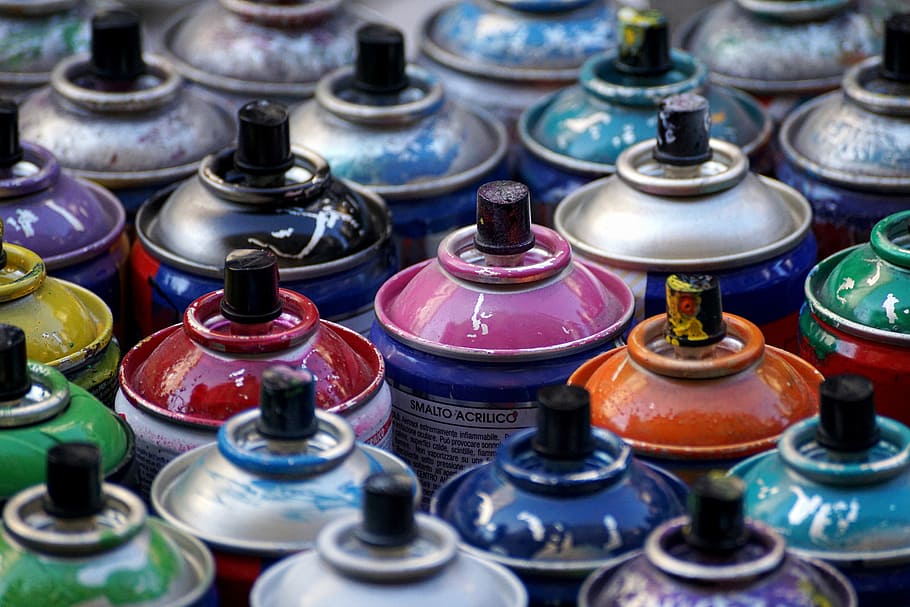Rust-Oleum spray paint formulations vary; some are oil-based, while others are water-based.
- Oil-based paints use mineral spirits or petroleum-based solvents, whereas water-based paints use water as the primary solvent.
- Oil-based paints typically have a stronger odor and longer drying time.
- Water-based paints usually have a milder odor and faster drying time.
- Oil-based paints may provide better adhesion and durability on certain surfaces.
- Water-based paints are easier to clean up with water.
- To determine whether a Rust-Oleum spray paint is oil-based or water-based, refer to the product label or manufacturer’s specifications.
When it comes to selecting the right spray paint for your project, understanding the composition and properties of the paint is essential. Rust-Oleum, a popular brand known for its diverse range of spray paints, offers different formulations for various applications.
One common question that arises is whether Rust-Oleum spray paint is oil-based or water-based. In this article, we will delve into the details and provide you with a step-by-step guide to determine whether Rust-Oleum spray paint is oil-based or water-based.
Is Rust Oleum Spray Paint Oil Based or Water Based?
| CharacteristicOil-Based Spray PaintWater-Based Spray Paint | ||
|---|---|---|
| Base | Oil | Water |
| Odor | Strong | Minimal |
| Drying Time | Longer | Faster |
| Cleanup | Mineral spirits or paint thinner | Water and soap |
| Coverage | Typically higher | May require more coats |
| Durability | Generally more durable | May be less durable |
| VOCs | Higher | Lower |
| Flammability | Higher | Lower |
| Environmental Impact | More significant | Less significant |
Is Rustoleum Oil Based?
Yes, Rust-Oleum offers oil-based spray paint formulations.
Step 1: Understanding Paint Formulations:
Begin by understanding the basics of paint formulations. Paint is typically made up of pigments, binders, solvents, and additives. The type of binder and solvent used determines whether the paint is oil-based or water-based.

Step 2: Differentiating Oil-Based and Water-Based Paints:
Oil-based paints use organic solvents like mineral spirits or turpentine as the primary solvent. These solvents are derived from petroleum or plant-based sources. Water-based paints, on the other hand, use water as the primary solvent, making them easier to clean up and less harmful to the environment.
Step 3: Researching Rust-Oleum Spray Paint:
To determine whether Rust-Oleum spray paint is oil-based or water-based, it’s important to consult the manufacturer’s information. Visit the official Rust-Oleum website or refer to the product label and packaging for detailed product specifications.
Step 4: Exploring Rust-Oleum’s Product Range:
Rust-Oleum offers a wide range of spray paints for various applications, including general-purpose, automotive, and specialty paints. Different product lines may have different formulations, so it’s essential to focus on the specific Rust-Oleum spray paint you are interested in.
Related: Why Does Spray Paint Crackle? Guide to Understand & Preventing Cracking in Spray Paint
Step 5: Examining Product Labeling:
Inspect the product label and packaging for relevant information. Look for keywords such as “oil-based,” “water-based,” or “acrylic-based.” Rust-Oleum typically provides clear indications of the paint type on their product labels, making it easier for consumers to identify the formulation.
Step 6: Checking Manufacturer’s Resources:
Refer to the Rust-Oleum website or other reliable sources such as official product guides or technical data sheets. These resources often provide detailed information about the composition and characteristics of Rust-Oleum spray paints, including whether they are oil-based or water-based.
Step 7: Seeking Expert Advice:
If you are still uncertain about the paint type, consider reaching out to Rust-Oleum’s customer support or consulting with paint professionals. They can offer guidance based on their expertise and experience with Rust-Oleum products.
Step 8: Making an Informed Decision:
Based on the information gathered from the manufacturer’s resources and expert advice, you can now confidently determine whether Rust-Oleum spray paint is oil-based or water-based. Consider factors such as the project requirements, desired finish, ease of use, and environmental impact to make the best choice for your specific needs.
What Are The Benefits Of Using Oil-Based Paint?

Using oil-based paint offers several benefits, including:
Durability: Oil-based paints are known for their durability and long-lasting finish. They provide a tough, protective coating that can withstand wear, abrasion, and exposure to harsh weather conditions.
Adhesion: Oil-based paints have excellent adhesion properties, allowing them to bond well with a variety of surfaces. This makes them suitable for use on challenging surfaces like metal, wood, or previously painted surfaces.
Smooth Finish: Oil-based paints typically provide a smoother and more leveled finish compared to water-based paints. They flow and level out more evenly, resulting in a professional-looking surface.
Protection: Due to their robust formulation, oil-based paints offer better protection against moisture, UV rays, and temperature changes. They are often used for exterior applications where a high level of protection is required.
Versatility: Oil-based paints can be used for both interior and exterior projects, making them suitable for a wide range of applications. They are commonly used on surfaces such as trim, doors, cabinets, furniture, and metalwork.
Enamel-like Finish: Oil-based paints often produce a glossy, enamel-like finish, providing a rich and luxurious appearance to painted surfaces. This makes them particularly desirable for decorative or high-end projects.
Related: What Are 5 Effective Methods To Prevent Spray Paint From Dripping?
What Are The Drawbacks Of Using Oil-Based Paint?
While oil-based paints offer several benefits, they also come with some drawbacks to consider:
Longer Drying Time: Oil-based paints have a longer drying time compared to water-based paints. It can take several hours to several days for the paint to fully dry and cure, depending on the conditions and thickness of the application. This longer drying time can delay project completion.
Strong Odor: Oil-based paints contain higher levels of volatile organic compounds (VOCs) compared to water-based paints. This results in a strong odor during application and drying. Adequate ventilation is crucial to minimize the inhalation of fumes and maintain air quality.
Cleanup and Disposal: Oil-based paints require the use of harsh solvents, such as mineral spirits or turpentine, for cleanup. These solvents can be harmful to the environment and require proper disposal. Additionally, the tools used for an application, such as brushes and rollers, also require solvent-based cleaning.
Yellowing and Fading: Over time, oil-based paints can yellow or fade when exposed to sunlight. This can affect the appearance of the painted surface, particularly in areas with high exposure to UV rays.
Potential Health Hazards: The higher VOC content in oil-based paints can contribute to indoor air pollution and may pose health risks, especially for individuals with respiratory sensitivities or allergies. It’s important to take necessary precautions, such as wearing appropriate personal protective equipment and ensuring proper ventilation during application.
Limited Color Options: Oil-based paints may have a more limited color selection compared to water-based paints. If you require specific or unconventional colors, you may find a broader range of options with water-based paint products.
What is the difference between the other brands and Rustoleum Spray Paint?
Yes, there can be differences between Rust-Oleum spray paint and other brands of spray paint. These differences can vary in terms of formulation, quality, color options, application characteristics, and overall performance. Here are some factors that may differentiate Rust-Oleum spray paint from other brands:
Formulation: Different brands may use varying formulations for their spray paints, resulting in differences in drying time, adhesion, durability, and other characteristics. For example, Rust-Oleum offers both oil-based and water-based spray paint formulations, while other brands may focus more on one type or have unique formulations.
Quality and Performance: The quality of the ingredients used, manufacturing processes, and quality control measures can vary between brands. This can affect the overall performance and longevity of the paint, including factors such as coverage, color retention, resistance to chipping or fading, and adherence to different surfaces.
Color Selection: Brands may have different color palettes and ranges available, including unique finishes and specialty colors. Some brands may offer a wider variety of color options, while others may specialize in specific color categories or finishes.
Application Characteristics: Spray paint formulations can have varying viscosity, spray patterns, and coverage capabilities. Some brands may focus on specific application needs, such as providing paints with excellent coverage in fewer coats, easy blending, or smooth application. These characteristics can influence the ease of use and the final appearance of the painted surface.
Brand Reputation and Support: Different brands have varying reputations based on their history, customer feedback, and overall market presence. This can indicate the brand’s commitment to quality, innovation, and customer support. Rust-Oleum, for instance, is a well-established brand known for its extensive product range and customer support resources.
How to Identify if Rust-Oleum Spray Paint is Oil-Based or Water-Based?
- Examine the Product Label: Look for keywords such as “oil-based,” “water-based,” or “acrylic-based” on the Rust-Oleum spray paint product label. The manufacturer usually provides clear indications of the paint type.
- Consult Manufacturer’s Resources: Visit the Rust-Oleum website or refer to their official product guides or technical data sheets. These resources often provide detailed information about the composition and characteristics of their spray paints.
- Contact Customer Support: If you’re still uncertain about the paint type, reach out to Rust-Oleum’s customer support for clarification. They can provide specific information based on the product you are interested in.
FAQs People Generally Looking For
How can I determine the type of Rust-Oleum spray paint I have?
To determine the type of Rust-Oleum spray paint you have, examine the product label and packaging. Look for keywords such as “oil-based,” “water-based,” or “acrylic-based.”
Additionally, referring to the manufacturer’s website or contacting Rust-Oleum’s customer support can provide clarification.
Can I use oil-based spray paint over water-based paint, or vice versa?
It is generally not recommended to apply an oil-based paint over a surface previously coated with water-based paint, or vice versa, without proper surface preparation.
The incompatible formulations may result in poor adhesion and paint failure. It’s advisable to follow the manufacturer’s instructions and guidelines for best results.
Can Rust-Oleum spray paint be used on different surfaces?
Yes, Rust-Oleum spray paints are designed for various surfaces, including wood, metal, plastic, chrome and more.
However, it’s essential to select the appropriate Rust-Oleum spray paint formulation based on the surface type and project requirements.
Consult the product labeling or manufacturer’s resources for specific surface compatibility information.
Are there any safety precautions to consider when using Rust-Oleum spray paint?
Yes, it’s important to follow the safety guidelines provided by Rust-Oleum. This may include working in a well-ventilated area, wearing protective equipment such as gloves and a mask, and keeping the spray paint away from open flames or heat sources.
Always read and follow the instructions and warnings provided by the manufacturer.
Conclusion:
Determining whether Rust-Oleum spray paint is oil-based or water-based is a crucial step in selecting the right paint for your project. By understanding the distinctions between oil-based and water-based paints, conducting thorough research on Rust-Oleum’s product range, examining product labeling, and seeking expert advice when needed, you can make an informed decision.
Remember to prioritize your project requirements, desired finish, and environmental considerations to choose the most suitable Rust-Oleum spray paint formulation for your painting endeavors.
Jane Ansems is a highly talented and accomplished spray can artist, known for her intricate, detailed, and thought-provoking works of art. She began her career as a street artist in the early 2010s, quickly gaining recognition for her unique and innovative style.
[…] paint is designed to provide a smooth, even coat of paint quickly and efficiently. However, when the […]